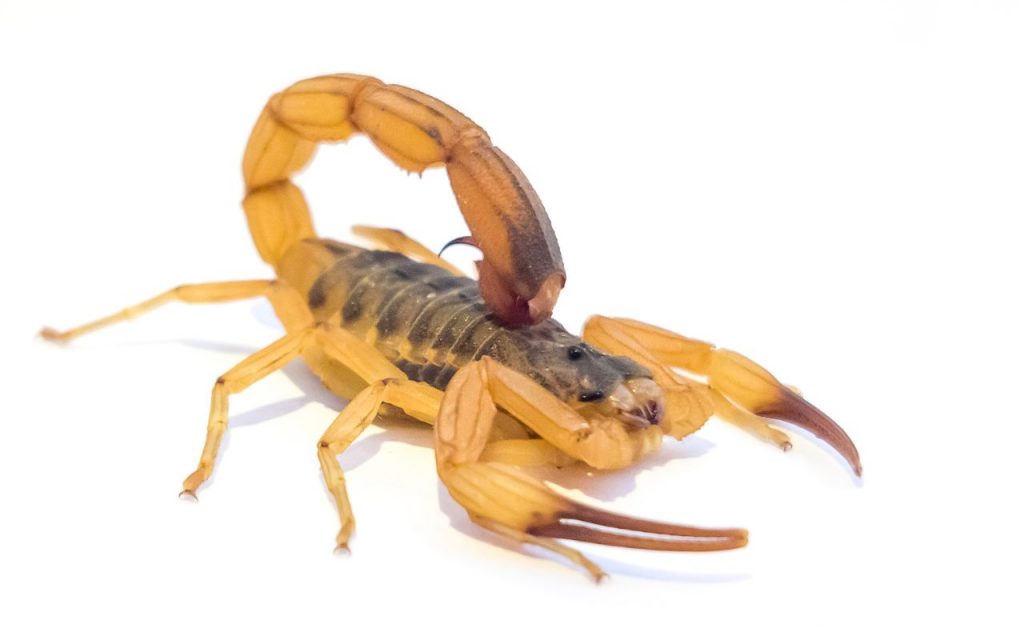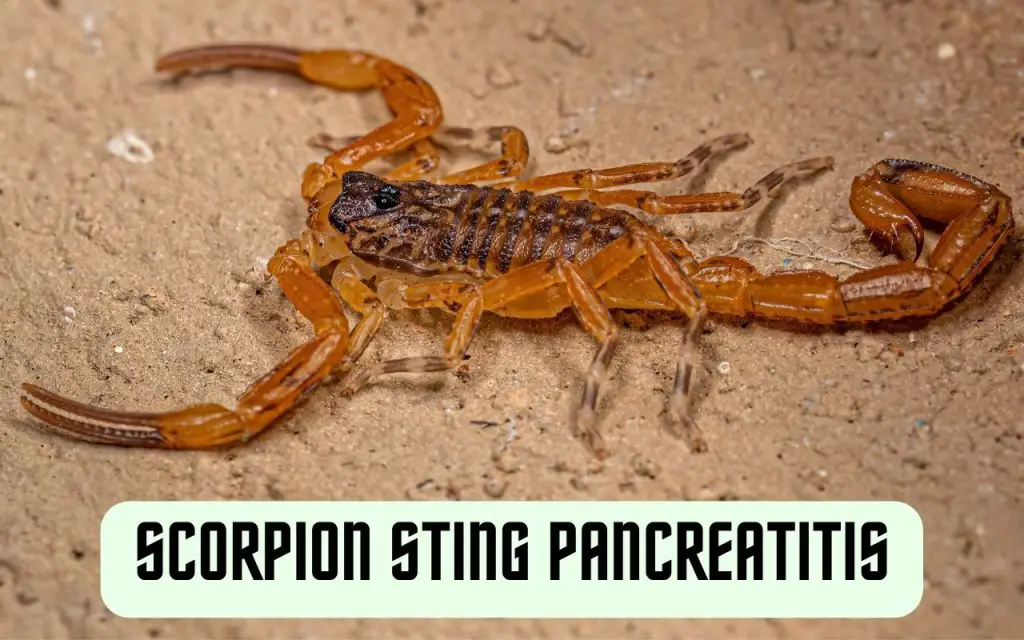As someone who has been engrossed in studying arachnids for most of my life, I have unearthed fascinating insights about these intriguing creatures. Today, I would like to shed some light on a peculiar yet important topic: the relation between certain scorpions and pancreatitis. Brace yourselves as we delve into the world of these tiny yet potent arachnids.
In this article, I’m going to explain which species have venom that can cause pancreatitis, as well as the health implications of the condition. As always, more research needs to be done on this subject, so even if you’re stung by a scorpion that I don’t mention here, you should still seek medical attention.
Pancreatitis Scorpion Mnemonic
I’ve found mnemonics to be incredibly useful when studying scorpions, as the variety of species and their distinctive effects can be overwhelming. To remember which scorpion causes pancreatitis, I use the mnemonic, “Pancreatic Pain from the Trinidad Titan (T.T.)”. This refers to the Tityus trinitatis, a scorpion species from Trinidad. The “T.T.” in the mnemonic stands for Tityus trinitatis.
Another popular mnemonic (not made up by me) is “Get Smashed” – which stands for Gallstones, Ethanol, Trauma, Steroids, Mumps, Autoimmune disease, Scorpion sting, Hypercalcemia, Hypertriglyceridemia, ERCP and Drugs. This is a more general one, aimed at remembering all possible causes of pancreatitis.
Tityus trinitatis Pancreatitis
Tityus trinitatis, or the Trinidad Thick-tailed Scorpion, is not just another scorpion. This arachnid has been linked to causing pancreatitis in humans. Native to Trinidad and Tobago, this creature’s venom is potent enough to trigger severe inflammation in the pancreas, leading to pancreatitis.
Tityus and Leiurus
While Tityus trinitatis takes the spotlight for causing pancreatitis, it’s crucial not to forget its close cousin Tityus serrulatus and the notorious Leiurus quinquestriatus. Both species also bear venom potent enough to cause pancreatitis, but it’s significantly less common than with T. trinitatis.
In case you’re wondering why the name Leiurus sounds vaguely familiar, it’s because Leiurus quinquestriatus is the infamous Deathstalker Scorpion – one of the most feared species on the planet.
T. serrulatus
Tityus serrulatus, often known as the Brazilian Yellow Scorpion, is found primarily in Brazil and adjacent areas of South America. Although it is widely known for its venomous sting, instances of pancreatitis caused by T. serrulatus are relatively rare. However, extreme cases have been documented and should not be ignored.

How does Scorpion Sting Cause Pancreatitis?
The primary mechanism by which scorpion venom causes pancreatitis remains an enigma. Some researchers believe that the venom has direct cytotoxic (cell killing) effects on the pancreatic cells. Others suggest an indirect mechanism, whereby the venom’s neurotoxic components disrupt the autonomic nervous system, leading to the dysregulation of pancreatic secretions and subsequently causing pancreatitis.
What are the Long Term Effects of Scorpion Stings?
Scorpion stings, particularly from potent species like Tityus and Leiurus, can have lasting impacts. Some potential long-term effects include:
- Persistent pain or numbness in the sting area. How venom works is poorly understood, and this may due to some kind of nerve damage (I’m speculating, of course)
- Hypersensitivity or allergy development towards scorpion venom. This is relatively common – getting stung a second time could well cause anaphylactic shock
- Psychological trauma. Children are particularly susceptible to developing a phobia following a painful sting
- In rare cases, organ dysfunction or failure (such as pancreatitis). Kidney damage is also a possibility
Acute Pancreatitis Causes
While scorpion venom is a recognized cause of acute pancreatitis, it’s worth noting that it’s not the most common one. The majority of acute pancreatitis cases are due to:
- Gallstones
- Alcohol consumption
- High triglyceride levels
- Certain medications
- Trauma or injury to the pancreas

What is the Fatal Rate of Pancreatitis?
While acute pancreatitis is a serious condition, the mortality rate is relatively low. According to the American Gastroenterological Association, the overall mortality rate for acute pancreatitis is about 5%. However, for severe cases or those with complications, the rate may rise to 30%.
Can You Live a Full Life after Pancreatitis?
Yes, most people can live a full life after pancreatitis. However, the key is adequate treatment, lifestyle changes, and regular follow-ups. For those who’ve had acute pancreatitis due to a scorpion sting, avoiding future stings is crucial.
Which Scorpion causes pancreatitis? Final thoughts…
Scorpions in the genus Tityus are the most likely to cause pancreatitis – and are particularly widespread in South America. Notwithstanding, other species can also cause the condition. If you are stung by any scorpion, you should seek medical treatment.
As a passionate student of arachnids, learning about the connection between scorpions and pancreatitis has been both exciting and eye-opening. It reminds us that even tiny creatures like the Tityus trinitatis have significant impacts on our health. This knowledge not only broadens our understanding of scorpions but also informs medical treatments and prevention efforts.
If you live in an area with scorpions, it’s crucial to remember some simple steps to prevent stings in the first place.:
- Don’t go barefoot – even inside your home
- Wear gloves when gardening, or doing any work outdoors
- Shake your shoes before putting them on
- Shake any clothing that has been left sitting near ground level
Disclaimer:
This website has no intention of providing medical information, and you should not rely on it for diagnosing any illness or injury. If you suspect that you have been stung by a scorpion, or that you’re suffering pancreatitis – stop reading and contact a medical professional. NOW!

Can scorpion venom cause pancreatitis?
Scorpion venom can cause pancreatitis, and how likely it is depends on the species. There are many well-documented cases of scorpions in the Tityus genus causing pancreatitis. Species in the genus Leiurus have also been implicated, though it is less common.
What are the side effects of deathstalker scorpion?
Initially, the sting of a Deathstalker Scorpion causes intense pain. This pain starts at the site of sting, then radiates outwards. After a short period of time, abdominal cramps, dizziness, sweating, vomiting, and diarrhoea may set in. This is due to the stress that the venom is causing to the nervous system.
What disease does scorpion cause?
Scorpion stings cause a range of mild to debilitating side-effects. Some species cause pain that is a mild as a bee sting, whereas others can cause death after a few hours. All-in-all, the most important complication to look for is anaphylaxis. This is an extreme allergic reaction that can occur from any bug sting, and sets in with minutes.







